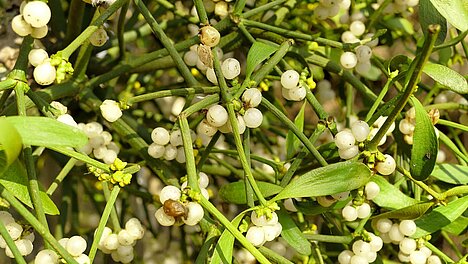Mistletoe

You may have heard of mistletoe, a plant that is particularly popular at Christmas time. But did you know that mistletoe is a medicinal plant that can also be used for dogs? In this article, you can find out more about mistletoe, its effects and its advantages and disadvantages for your four-legged friend.
What is mistletoe?
Mistletoe is a plant that grows on trees and feeds on their nutrients. It has green leaves and white berries that are poisonous. Mistletoe has been used in folk medicine for centuries, especially for diseases of the cardiovascular system, the immune system and cancer.
How does mistletoe affect dogs?
Mistletoe has a number of effects on dogs, which can be both positive and negative. The positive effects include:
- Mistletoe strengthens the immune system and can therefore prevent or fight infections.
- Mistletoe has an anti-inflammatory and pain-relieving effect and can therefore help with arthritis, rheumatism or other joint problems.
- Mistletoe has a blood pressure-lowering effect and can therefore prevent or treat cardiovascular diseases.
- Mistletoe has an anti-tumor effect and can inhibit or slow down the growth of cancer cells.
The negative effects include:
- Mistletoe can trigger allergic reactions, which can manifest as skin rashes, itching or shortness of breath.
- Mistletoe can lead to gastrointestinal complaints such as nausea, vomiting or diarrhea.
- Mistletoe can lead to a tendency to bleed as it affects blood clotting. This can be dangerous in the case of injuries or operations.
- Mistletoe can lead to poisoning if it is administered in too high a dose or in combination with other medications. The symptoms of poisoning are convulsions, tremors, shortness of breath or unconsciousness.
How is mistletoe used for dogs?
Mistletoe for dogs is usually administered as an extract obtained from the leaves or twigs of the plant. The extract can be administered as drops, tablets or injections. The dosage depends on the dog's size, weight and state of health. It should always be administered under veterinary supervision.
Mistletoe is a medicinal plant with many effects on dogs. It can help with various illnesses, but can also have side effects or risks. The use of mistletoe should therefore always be weighed up carefully and discussed with your vet. If you want to do something good for your dog, you can also offer him other natural remedies, such as camomile, arnica or valerian.
If you notice any signs of hypersensitivity or poisoning in your dog, you should see your vet immediately. We are not a substitute for a vet, but we try to be as accurate as possible. Every dog reacts differently and we recommend you get a second opinion or consult your vet if in doubt.
Stay healthy and take good care of your four-legged friend!😊
Similar to Mistletoe
Unfortunately, ivy is poisonous to dogs. Both the leaves and the berries contain saponins, which can lead to symptoms of poisoning. These are vomitingdiarrheasalivationtremblingshortness of...
Laurel is the name for various plant species from the laurel family. The best-known species is laurel (Laurus nobilis), which originally comes from the Mediterranean region and whose leaves are used...
Hawthorn is a shrub or small tree that belongs to the rose family. It grows mainly in Europe and Asia and has white or pink flowers that appear in spring. Small red berries develop from the flowers...
Holly (Ilex aquifolium) is an evergreen shrub or tree that belongs to the holly family. It grows in gardens, parks and forests in Europe and has shiny, leathery leaves that are often serrated. From...



